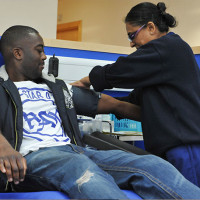This Black History Month NHS Blood and Transplant is urging black people to register as blood, organ and stem cell donors and “Be There” for people from their community who need life saving or life enhancing blood transfusions, stem cell transplants and organ transplants.

Black people are currently under represented as blood donors, with less than one percent* of active blood donors coming from Black African, Black Caribbean or mixed race communities. There are currently more people living with Sickle Cell Disease than there are active black and mixed race donors.
There are also fewer black organ donors as last year only 20** out of the 1,282 deceased donors in the UK were from the black community. In contrast there are currently around 600 black people waiting for an organ transplant with the vast majority of those in need of a kidney transplant.
Ethnicity can often play an important part in blood transfusions, stem cell transplants and organ transplants. Black donors are more likely to have rare blood and tissue types and black patients are more likely to require these rare types so it is essential that we have more black blood, organ and stem cell donors.
Additionally black people are more likely to need an organ transplant than people from white communities as they are more susceptible to illnesses such as hypertension, diabetes and certain forms of hepatitis, all of which may result in organ failure and the need for a lifesaving transplant.
Kidneys are allocated according to many factors, with blood and tissue type amongst the most important. Matching is likely to be closer when the ethnicity of the donor and the recipient are closer. As only a small percentage of deceased donors are from black backgrounds, this can delay a suitably matched kidney being found and black people will often wait a year longer for a kidney transplant than people from white backgrounds.
Sickle Cell Disease is a genetically inherited blood disorder in which the oxygen carrying the red blood cells are more likely to alter their shape and cause problems such as bone pain. It is most common in the black community. Patients with this condition often require regular blood transfusions. Blood transfusions from donors with a similar ethnic background give the best match and outcomes in the long term.
Some blood types are more common in black and mixed race communities whilst some rare types are only found within these communities.
Stem cell donation can help save the lives of people suffering from leukaemia and sickle cell disease as well as other diseases of the immune system. Around 70 percent of patients have to rely on a matched volunteer donor, identified through the British Bone Marrow Registry. People from black backgrounds are less likely to find a match than Caucasian patients.
Ian Trenholm, Chief Executive at NHS Blood and Transplant said: “We really do need more black blood, organ and stem cell donors to help support black patients. Many people think that blood is only needed in an accident or emergency situation but people with Sickle Cell Disease often need blood transfusions on a regular basis just to stay alive.
“Blood donations can also be used before, during and after childbirth and for surgical procedures such as life saving transplants.
“In addition, if you require an organ or stem cell transplant you are far less likely to find a match if you are from black or mixed race community, simply due to the lack of black donors on the registers.
“We’re incredibly grateful to those who already donate blood, who have joined the Organ Donor or stem cell registers but it is vital that we encourage more black people to sign up and talk to their family and friends about their decision.
During the month long campaign, NHS Blood and Transplant has a number of exciting initiatives to raise awareness and boost donor numbers.
NHS Blood and Transplant will be working with community and faith groups such as the ACLT and a social media campaign will run throughout the month.
Additionally NHS Blood and Transplant will be undertaking radio partnerships with Capital Xtra, New Style Radio, Premier Gospel and Colourful FM to promote the need for black blood donors.










